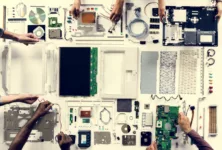Someone outside the trade might wonder what a virtual machine is. A machine that is virtual? Of course not.
The meaning of virtual machine is different from, and far more complex than, that suggested by its name. A virtual machine (VM) is an emulation of a computer system which has the functionality of computer hardware and runs in an isolated environment.
1.
How does a virtual machine work?
First, mirroring an existing OS, a virtual system has identical functionality as any Windows OS. In a virtual system, all operations are completed within this very isolated environment, where you can install and run software, store data and have your independent desktop, without affecting the real system. There are also virtual operating systems which allow you to switch between the real system and its mirrored counterpart very easily.
What is a virtual system?
Differences between a virtual system and traditional virtual machines: starting a virtual system takes less time than a Windows OS and computer programs can also run at a higher speed, without compromising computer performance, whereas the operation speed of a virtual machine is much slower as it must simulate the underlying hardware instruction set. A virtual system can only simulate an environment identical with the current OS, while a virtual machine is capable of simulating other OS.
Comparable to an OS, a virtual machine is responsible for simulating the operation environment and the OS of an APP. Just like when you are remodeling a house, before moving in the furniture you’d always want to draw up a blueprint, which is similar to our virtual machine.
2.
Now let’s get to know about Tron Foundation, who has just unveiled a new version of its virtual machine.
In the first half of 2018, the launch of Tron’s virtual machine in test version was a great sensation in the blockchain industry. TRON Virtual Machine (TVM) is a lightweight, Turing complete virtual machine devised for the development of Tron’s ecosystem. It is expected that the TVM can provide millions of global developers with a custom-built system for blockchain that is efficient, developer-friendly, stable, secure and scalable.
TVM can connect seamlessly with the existing development ecosystem and supports DPOS. TVM is compatible with the EVM environment in its initial phase, so that instead of learning a new programming language, developers can develop, debug and compile smart contracts in a Remix environment with Solidity and/or other languages that they are familiar with. Once a smart contract is uploaded to TRON’s mainnet, it will be executed on the TVM of the Super Node and remain isolated from external connections.
Furthermore, TVM introduces the concept of bandwidth. Different from the gas mechanism on Ethereum’s EVM, transfers or operations of smart contracts on TVM do not cost tokens. Technically, the executable computation capacity on TVM is not restricted by the total holding of tokens.
Sounds awesome, right? But these are only the features of TVM test version. The official TVM to be launched is even more powerful.
The developer-friendliness and security of the new version will be enhanced to improve the efficiency and safety of smart contract development. It is said that, as a middle layer, the final implementation of TVM will be compatible with the VMs of both Ethereum and EOS to attract more developers to Tron’s ecosystem.
3.
Most people are now no strangers to the concept of blockchain. With the popularization of the blockchain technology and relevant concepts, the implementation of blockchain can be found in more application scenarios. Technology is transforming our mentality and our products, while in turn our mentality is also sparking new innovations.
As a major pillar of the blockchain technology, the virtual machine has also been evolving.
That virtual machines are implemented on blockchains reflects the need of blockchain development; its evolution also faithfully depicts the advancement of blockchain technology. Currently, the development of VMs not only better supports DAPPs, but also indicates their own importance.
Judging from the development of blockchain VMs, we can tell that the future of blockchain does not lie in the smart contracts that run on VMs, but the intelligence of VMs themselves. Spearheading the development of blockchain, Tron will continue to surprise the industry.








